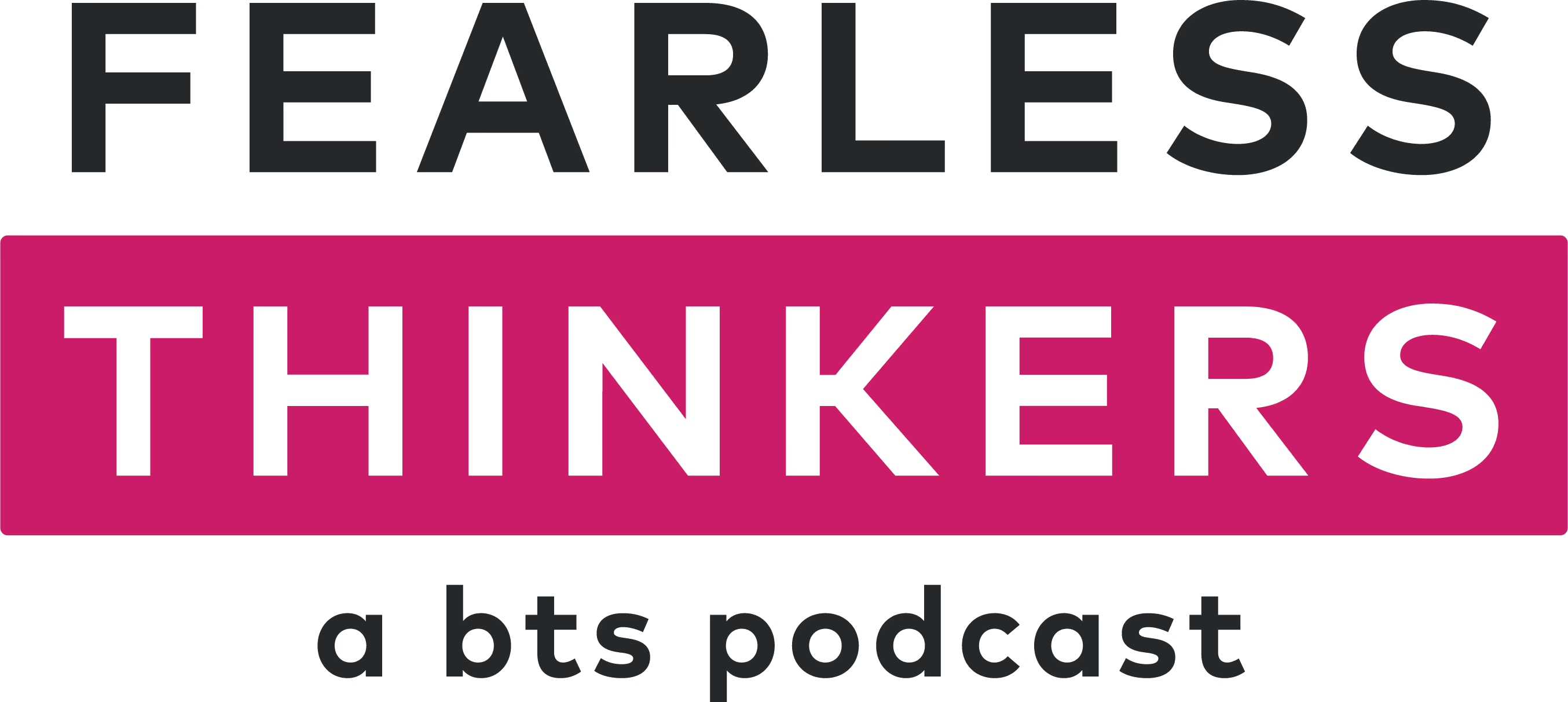5 mind traps limiting your sales team’s performance

5 mind traps limiting your sales team’s performance
Join host Rick Cheatham in this episode of Fearless Thinkers as he chats with Miguel Sequeira, an expert in sales leadership, about the five key mind traps holding back sales teams. As we kick off the new year, it’s a great time to reflect on how to drive a winning mentality in your teams. From the 'victim mindset' to the 'lone wolf mentality', Miguel uncovers the common barriers that can prevent high sales performance and how to overcome them. Discover strategies for leaders to recognize and address these traps, empowering their teams to embrace change and drive success. Tune in now!

Most of us want to lead in a way that matters; to lift others up and build something people want to be part of.But too often, we’re socialized (explicitly or not) to lead a certain way: play it safe, stick to what’s proven, and avoid the questions that really need asking.
This podcast is about the people and ideas changing that story. We call them fearless thinkers.
Our guests are boundary-pushers, system challengers, and curious minds who look at today’s challenges and ask, “What if there is a better way?”If that’s the energy you’re looking for, you’ve come to the right place.
Rick: Hello, welcome to Fearless Thinkers, the BTS podcast. As always, I am Rick Cheatham, your host. Today we have a great treat. One of my great friends, Miguel Sequeira is joining us today. He's a leader in our sales and marketing practice and has deep, deep experience working with commercial organizations all over the world.
So today he's bringing us some great insights into the mind traps that prevent sales organizations from changing and executing as they should. So with that, let's get started.
Rick: Hey, Miguel, welcome to the show.
Miguel: Thanks, Rick. Thanks for inviting me.
Rick: Absolutely. I have to say my friend, it was such a great time seeing you last week at our global conference. It's always great to get together with our colleagues.
I'm excited to talk to you today because I think, with everything that's going on in the world, our friends that are customer facing, and our friends that are sales leaders, especially, trying to navigate today's world and get their sales organizations mobilized for another year of change.
I mean, I think change is so constant for us in today's environment. And as we had the chance to chat, I thought it was really interesting, as you were thinking about some of the work you've been doing, some of the research you've done, the conversations you've been having about the mind traps— I believe you call them— that really get in the way of sales organizations performing. So I'm wondering if you could share with us a little bit, about those and then we can dig deeper.
Rick: Hello, welcome to Fearless Thinkers, the BTS podcast. As always, I am Rick Cheatham, your host. Today we have a great treat. One of my great friends, Miguel Sequeira is joining us today. He’s a leader in our sales and marketing practice and has deep, deep experience working with commercial organizations all over the world.
So today he’s bringing us some great insights into the mind traps that prevent sales organizations from changing and executing as they should. So with that, let’s get started.
Rick: Hey, Miguel, welcome to the show.
Miguel: Thanks, Rick. Thanks for inviting me.
Rick: Absolutely. I have to say my friend, it was such a great time seeing you last week at our global conference. It’s always great to get together with our colleagues.
I’m excited to talk to you today because I think, with everything that’s going on in the world, our friends that are customer facing, and our friends that are sales leaders, especially, trying to navigate today’s world and get their sales organizations mobilized for another year of change.
I mean, I think change is so constant for us in today’s environment. And as we had the chance to chat, I thought it was really interesting, as you were thinking about some of the work you’ve been doing, some of the research you’ve done, the conversations you’ve been having about the mind traps— I believe you call them— that really get in the way of sales organizations performing. So I’m wondering if you could share with us a little bit, about those and then we can dig deeper.
Miguel: Sure, Rick. I think it’s quite interesting, and I must say your mindset at the start of the year makes a lot of difference. What we found out in the last two, three years, is that, things are changing, and are changing faster.
And of course, there are some core capabilities that salespeople need in order to actually perform better. But if there’s one thing that is really making a difference right now, is the mentality of those salespeople. And what our research points is that there are five key mind traps that sometimes limit the productivity, either from sales representatives but also from sales managers.
The first one is what we call a mind trap of victimism. The second one is around what we call lonely wolf. Another one is the comfort zone. Fourth one is the pleaser. And the fifth one is what we call a control freak.
Rick: Well, you’re already hurting me. Cause as a career salesperson, I think that I’ve probably done all of those things at one point or another in my career. But let’s start to break them down. So when you say victimism, what are you really talking about there?
Miguel: So someone that is trapped into that kind of mentality of victimism it’s someone that is not seeing the issues or the problems as they are, right? So for example, conversation with their manager point of view, they tend to focus the conversation towards finding the reasons why they are not doing certain things, why they are not getting to results, why they are not using the CRM, versus what could they do in order for that to happen. Right? So at the end of the day, this kind of mind trap prevents you to see the issues as they really are and prevent you to act and change things. And to the point that we talked before, things are changing, and they are changing faster. So if this prevents you to act, then that’s a big limitation when an organization needs to change at a faster pace.
Rick: Yeah, and so if I kind of rewind my brain back through time when i’ve seen that in action, it’s really when the seller quite often takes on the customer’s point of view almost exclusively, and it’s her/his own organization doing something to them versus them seeing themselves as part of the change, part of the organization. As opposed to stuff being done to me, I’m actually part of the solution and getting it done. Is that fair?
Miguel: Absolutely, Rick. I would say the customer, the market, the politics— everything that is exogenous tends to come into place versus me as part of the solution.
Rick: Great. So now let’s talk about this lone wolf concept. I’m guessing that turns into, ” You know what? I’m just going to go out and do my thing. I know how to hit my number. I got this.” But, explain better, please.
Miguel: Yeah. So the lone wolf— this is a mind trap that is if you look at a career of a sales rep, it doesn’t tend to appear so much in the first years of your career, more when you’re experienced and so on. So it’s kind of this mentality, “Yeah, yeah, yeah, yeah. You know, I understand that, this initiative is important, but, you know, I’m getting to my results. I’m doing my things, so don’t disrupt my way of working. I understand all of the importance that can have. It simply doesn’t apply to me.” So if a person is in this mind trap, they tend to fall, more and more into that mind trap, because they tend to do things more in their own way. So they tend to, in a moment of change, to get even more distant from the way that the organization is trying to work moving forward.
Rick: Interesting. And so I actually want to jump down. We’ll come back to those that like staying in their comfort zone. Let’s jump down to the pleaser because I would think that it would almost be the exact opposite of the lone wolf.
Miguel: Yeah, it has some opposition to the lone wolf. So the best way that I can describe the pleaser is in two ways . So one is the external, right? So imagine an organization that is trying to sell in a different way. So they’re focusing more on specialized products, or they’re trying to focus more on value based products and services, right? So a pleaser tends to have a tough time if they are in that mind trap because, to sell in that kind of way, you need to have a point of view on things, and pleaser just like to do whatever the client requests. Right? So that tends to be a big barrier to change a way of selling, especially if you’re in a movement to value-based selling. The second lens that you can look at a pleaser is from an internal perspective, which is—imagine that you’re a sales manager, and you have four or five people that are trapped into the pleaser mindset.
So you finish your team meeting on a Monday. So the way that this meeting will end is that the pleasers will all say, “Yeah, yeah, we agree, we agree, we agree. Yeah, let’s go, let’s execute it.” So what will happen is that first, the truth, the disagreement might not come to the surface. So that’s the first thing.
And if that doesn’t come into the surface, even though they say they’re gonna do it, a lot of times what ends up happening is that either they don’t do it or they pretend they are doing it. So in the end, change is not happening again.
Rick: It’s funny because I see that pleaser, I think, frequently on the customer side too. When I was leading large sales teams I would often tell them that your most difficult contact may not be the person that is always challenging your value and pushing you to be better and isn’t always available. The most challenging contact could very well be that pleaser that always has time with you and would love nothing more than to go for a coffee, but has absolutely no intention of buying. They just want to be liked, and they want the recognition and attention. So I think that pleaser mindset can hurt sellers in a few different ways.
But let’s back up and talk a little bit about those that are kind of stuck in that comfort zone place.
Miguel: Yeah, so you can also recognize this one in various areas of a company, that this tends to have, which is whenever there’s change, there’s fear, and comfort zone, even though it appears that these people don’t want to act. A lot of times what’s behind it is that they have a fear to act.
So they fear the unknown. Best example right now, in the moment that we are is artificial intelligence, right? So we have a lot of clients that are trying to push artificial intelligence into the sales team so that they show up in a better way to the clients. They show up more prepared. They are showing up understanding more of the market than the client.
The thing is that when you hear artificial intelligence still today, there are a lot of people That have a lot of fear of what it means to use artificial intelligence. So this is a deep mind trap. , it’s difficult to change. But sometimes a big difficulty for a sales manager or sales leader is to identify that they are actually in the comfort zone because And not necessarily because they don’t want to do it, which is very different from the lonely wolf, for example.
Rick: Yeah it is interesting because when you first started talking, I was like, isn’t this just kind of a different way to group the what’s behind a lot of the other behavior. But I do think, when I reflect on the times that I was either a lone wolf or a pleaser, or I’ve seen it in others, it tends to come from a space of, I may know better.
I know how to make the customer happy. I’ve been selling this way for 15 years, and I’m not going to change. Versus what i’m hearing you say in the comfort zone. It’s like, gosh, I want to do this, but i’m so worried about how i’m going to show up. I’m so worried you know, fill in the blank of worry, worry, fear. Versus I’ve got things under control, that kind of mindset. And speaking of control, let’s talk about our controllers, please
Miguel: Yeah. So the control freak appears in all sales teams, usually, in a context that they have to manage multiple people in an account, either from customer service, customer success, pre sales, et cetera.
So imagine a key account manager that has different people in that account team. A control freak will show up, and sometimes they’re not verbal about this, but you can feel it, which is, I need to be in every meeting, otherwise we don’t get what we need. So they tend to overrate, first of all, their impact. That’s why it becomes so present when you have key accounts and so on. Where you have the power to explode those accounts.
There’s so many hours you have in a day, right? And there’s a sweet spot for an account to go from good to great. And that sweet spot is what I like to call a controllable discontrol. Meaning everyone is coordinated, everyone is aligned, but that doesn’t mean that you need to be in every meeting, okay?
Or in every interaction, right? So that limits a lot the growth or the way that we want to grow. Also with the client’s this control freak.
Rick: So the really interesting thing for me, as I’m thinking back on the sales managers, you know, those frontline leaders and the sellers that I’ve worked with through the years. And I look at what you were saying here, and it feels to me like a lot of times, if I was assessing my team, I would probably expect that control, lone wolf, pleaser type behavior to come from my top performers, while those that are kind of acting in fear or acting as a victim were those that are probably a little more insecure in their performance or their role in the team. Have you seen those kinds of trends, or am I just possibly making things up based on my own experience?
Miguel: Yeah, you know, I never thought about it, to be honest. It is true. Maybe there’s a tendency in that way. However, I think that the word there is changed because you might also be in a mind trap of victimism in the sense of you might be delivering performance in terms of the number, but you might not be delivering performance in terms of how you get to that number.
So you get all of the excuses on why not to do it, right? But yes, maybe there’s a higher tendency in that way. Maybe that’s the next phase for our research.
Rick: There you go. Well, you know, my last question for you, and this is one that I can’t help but ask. If I’m a sales leader out there listening to this, what potentially can I go do with this knowledge that could take my team further or make me better as I continue my day today?
Miguel: Good question. Maybe I’ll refer to the way that we started this podcast, Rick. One of the things you mentioned when I talked about the five mind traps, you said, I can definitely recognize myself. So the first thing that a leader can do is that this is only natural to happen, meaning you are not the mind trap. Depending on the moment of the career or the change or the results that you’re getting, you might be falling into one of these mind traps, either you as a sales leader or one of your sales people.
So I would definitely say that the first thing is recognize. The second thing I would say that it’s instilling in your sales team that this is natural. And then ask them a question that I feel that is very powerful, which is: Who wins when you’re in one of these mind traps? And from a sales perspective, the answer usually to that question is the only agent that wins there. If you’re in one of these mind traps, it’s competition.
The customer won’t win if you’re in a victimism mode. For example, you won’t change the results, the team won’t change the results, the client won’t get better things. Only the competition will win. So instilling this mentality in your team—that this is normal— so let’s recognize it and change it faster, is great.
And then lastly, and this is especially for our more senior leaders, I would say from a systematic point of view, make sure that you’re also assessing what are the most probable mind traps that your team might be falling. At which stage, for example, we see that a lot of the companies that are more successful with their sales managers are the ones that are actually assessing what are the mentalities that their individual contributors, that they usually promote to sales manager role, what are the mentalities that they are actually exhibiting, and what is the probability of doing it.
So having a systemic view and a systematic approach to assessing people along the way in the change, I think, makes a huge difference to our senior leaders.
Rick: I think that is really really great advice. Part of what I was hearing you say there is we’re probably going to fall into different mind traps all over time in different circumstances. So just bringing the awareness to yourself and your team is probably a big jump forward. So great advice. Well, thank you so much, my friend. You’ve really given us a lot to think about and we’ll have to have you back soon. I can’t wait to hear about how things progress with you and the great sales organizations that you work with.
Miguel: No, thanks for inviting me. It’s been my pleasure.
Rick: All right. Talk soon
Miguel: Bye.
Related Content

Many organizations invest large sums in assessments and training programs, but too often, employees revert to their previous ways.
This occurs because the initial assessment and resulting intervention targeted the symptom (behavior), rather than the root cause (mindset), of a performance gap.
So, how can an organization create long-lasting, business-improving behavioral change?
Assessments should expose the subliminal thoughts, feelings, assumptions, and beliefs that drive an employee’s current performance, or that may obstruct their full potential. Only then can assessors accurately design interventions that shift mindsets, and therefore behaviors, for the better. Here are three instances of how your organization can use this approach.
From individual insight to customized coaching
Oftentimes, excellent salespeople-turned-sales managers struggle to share their wisdom and drive peak performance from their teammates. Why? Because their individual insights into the art of selling are not universal.
No one skillset nor tried-and-true script makes a great seller. Rather, successful salespeople have a certain belief system that drives their curiosity towards customers, reactions to rejection, and general stamina. A simple shift in any of these mindsets can transform a sales team.
So, how do you implement this within your own team? Start by leveraging a mindset assessment that identifies the beliefs, values, and experiences currently at play. Then, follow up with a behavior-changing tool, such as personalized coaching, to help team members shift to mindsets that cement learning and ensure long-term behavior change.
Mindset shifts in multitudes
Pod coaching, also known as small-group coaching, is another way to leverage mindset assessments. Mindset assessments can be deployed at scale to provide cohort-level data, helping you select the key mindsets that need to change within a larger community.
For example, a leading multinational energy organization leveraged mindset assessments to map out a pod-coaching journey for its teams. The organization assessed 80 employees, identifying and creating customized coaching content to address the group’s most-needed mindset shifts. As a result, the journey was highly relevant to the teams’ most critical needs.
Some organizations have adopted cloud-based, self-paced individual learning journeys, the design of which is informed by mindset assessments. These mindset assessments identify individuals’ most beneficial shifts, which are then incorporated into their individually-personalized learning journeys.
Armed with this data, organizations can prioritize the shifts they see as critical for their people’s development today and save the shifts that will be more impactful in the future for a later date. The result is an ongoing personalized journey that grows with employees.
To ensure that your people’s default behaviors are the right ones for your organization, consider using mindset-evaluation assessments rather than behavior assessments. Mindset assessments allow you to identify and address the root cause of your peoples’ existing beliefs, shift them to ones that are aligned to your organization’s values, and structure a sustainable future for your organization.

At a workshop on virtual selling for the Key Account Managers of a Fortune-100 technology corporation, Anna, a participant with over 20 years of experience said:
“I can’t wait for this to be over and to go back to visiting my clients as usual.”
In today’s environment, comments like these are not uncommon – reluctance to change is a constant of human behavior and the world of hybrid selling is challenging for even veteran sellers. At the end of a recent Sales Transformation updating the sales model of a leading pharma company, Luis, a sales representative, commented:
“In our work, face-to-face meetings are all you need, all these tools (you just showed us) are no good.”
The number of people resistant to virtual selling in the last several months has soared to new heights, but this is not a sustainable mindset for the future.
Virtual selling in today’s environment
Virtual selling is not new. What is new is the speed at which it is being adopted under the current circumstances – at some organizations, by force, and at others, with great reluctance, as in the examples of Anna and Luis respectively. Mindsets like theirs are present in all sales organizations and purchase departments and represent the innate human response to a perceived threat, fight or flight. Employees will either take flight, mentally checking out, experiencing denial, and waiting for the storm to pass, or they will fight, taking action to sell virtually, but longing for things to be “back to normal”. What these Salespeople don’t realize is that virtual selling is here to stay and that its adoption cycle has shortened. In fact, virtual selling can be a significant advantage if they get a few things right. Welcome to the world of Hybrid Selling, where Salespeople strategically mix face-to-face with virtual client interactions to boost their productivity and results.
Does this imply that, once the physical access to clients is back, Salespeople will hardly leave the office? Nope. Or that building a great business relationship with new and potential clients will happen online with the same effectiveness? Also, no.
Still, looking ahead to the future of Salespeople like Anna and Luis, it is easy to picture them being outperformed by more dynamic colleagues, those who keep using virtual selling as another weapon in their arsenal once the pandemic is over. But how?
3 tips for Hybrid Selling
Trends from organizations across geographies and industries where face-to-face meetings are now possible suggest that there are 3 things Salespeople need to define:
- Determine your “efficient” time. This is the percentage of your time that could be more productively used for tasks other than meeting clients in person. What if, instead of travelling around to visit clients, you used part of that time to look for new prospects? Or to attend more industry events? Or to craft better proposals? Or to think of insights to bring to the existing clients? You get the idea. This percentage of your time and what you use it for are highly subjective, though our early findings suggest that it should account for less than 20 percent of the total work time. To determine your own percentage of efficient time, think of how many hours in a week you wished you had available to be more productive through tasks other than face-to-face meetings. If you are still undecided go with 10 percent for now (four hours per week). Then make a wish-list of what you would use your efficient time for – two or three elements will be enough.
- Implement a set of criteria to determine what meetings can go virtual. Now, look at your agenda for next week and decide what client meetings should go virtual to free up your goal efficient time. There is no magic formula here, though a checklist of criteria can help you weight the pros and cons. To aid in this, organizations can create defined guidelines to help make this decision easier for Salespeople – e.g. all first meetings with new potential clients should be face-to-face, if the key decision maker for the client is attending through videoconference you should do that too, etc. In most cases, multiple variables come into play, which makes the decision more nuanced. Still, it is helpful to review a set of criteria / dimensions such as in the example below. (Note: the content of the “Face-to-Face” and “Virtual” columns is specific to each Sales organization and should be agreed upon internally).

- Create a checkpoint plan to learn as you go. Steps one and two are a trial-and-error process: in the new reality most Salespeople are still learning how to engrain virtual selling into how they work. Leverage the process above once or twice before assessing your outcomes and make adjustments to create your own plan. Here are a few questions to help you get started:
a. Do you still need the same percentage of efficient time for the following weeks?
b. What quick wins are you observing, if any, in your new way of working? Are they scalable? What is their potential?
c. To what extent are you missing out on important face-to-face interactions? Include your clients’ feedback to get a full perspective.
COVID-19 has brought a shift in how Salespeople work and how clients expect Salespeople to interact with them. The good news is that traditionalist clients who would never take a virtual meeting in the past have now been forced to experiment with virtual communication tools and are more likely to accept some meetings as virtual interactions. Still, many seasoned account managers are dying to go back to the “good old days” of face-to-face meetings as soon as possible. These Salespeople are right to assume that face-to-face interactions will play a key role in the future, but their refusal to embrace hybrid selling is a big mistake – and will result in a missed opportunity for increased performance.
Who wants to be the next Anna or Luis? You have an opportunity to become a more productive Salesperson in the new normal, now it’s up to you to take it. If you don’t… others will.

This article was originally published in Sales & Marketing Management here.
It’s not enough to prepare for a sales call with general industry knowledge. Sellers need business acumen: a customer-specific grasp of business objectives and the metrics a customer uses to measure success.

Sellers need these insights in order to be agile in conversation and adjust their talking points as needed to address the motivations of different executives. That’s how they can position themselves — and the companies they work for — as true partners in success.
As it stands, only 20% of salespeople are prepared to offer any real value during a sales call. For sales leaders, it’s essential to develop their teams’ business acumen so that sellers are equipped to develop ongoing relationships with customers.
Customer-Centric Sales
Business acumen brings credibility. A seller who can range around in a conversation, listening for cues to shift to different business priorities and genuinely landing on the executive’s radar, will be invited back for further meetings.
This savvy also allows sellers to engage around the entire sales cycle and open up opportunities throughout. When sellers can see things from a customer’s perspective, they become trusted advisors.
Sales leaders can build their teams’ business acumen by facilitating the following steps:
1. Gather deep industry knowledge.
It’s not enough to have company-specific information; sellers need a working knowledge of their customers’ industries as well. It goes beyond “show me you know me” to being able to demonstrate exactly how a product or service will benefit a business — or, more to the point, the person seated across the table or fielding the call.
Sellers need to gather in-depth information about prospects and customers. Hit up social channels, read their 10-Ks, and keep up with industry press to know what’s going on right now: What are prospects’ recent struggles? Successes? Competitors? Customers they serve? What are the personas and demographics? All this information can provide context, allowing the seller to speak directly to prospects’ pain points and develop custom solutions for their businesses.
2. Develop the skills to secure a meeting.
Of all the skills to master as salespeople, getting introductions tops the list. In fact, 70% of customers value “connected processes” — contextualized engagements. Think of it as a seamless hand-off between a person in the seller’s network and a decision maker at a company.
Introductions entail more than the introduction itself. They also involve a strong point of view and the right questions to ask so that the customer executives open up about their businesses. It’s all about being relevant and bringing value to the conversation.
Related Post: 4 Ways to Help Your Salesforce Excel
3. Understand customers’ metrics.
Many salespeople enter the room with some understanding of a customer’s business challenges. Not as many come in with knowledge around the financials, initiatives, and KPIs used to measure success. Knowing how an executive will measure success lets a seller speak to those points specifically.
The seller must focus on the customer by offering assistance, following up regularly, and even helping to strategize next steps. The goal here is to ensure that the customers adopt the company’s products or services and see its business value. After all, their success will encourage additional purchases and a stream of revenue over time.
Related Post: How to Lead High Value Meetings with Senior Executives
4. Pair the offer with the value proposition.
Sellers need to have an offer that’s helpful or valuable. They need to know the products or services that will address the customer’s business challenges.
These discussions should carry over into training and enablement. One way to prepare sellers is through simulations, which let customer-facing teams immerse themselves in a customer’s challenges. Being on the inside of a business allows sellers to become more intuitive and develop custom solutions for current customers. And practice, whether with a seller’s manager or a professional coach, helps sellers to develop confidence in a safe environment.
Business acumen opens up the playing field for sellers, whether that’s through a new opportunity, greater customer success, or increased influence with a different executive within the customer’s business. Conversational agility and opportunity will give sellers the consultative skills that foster successful relationships.

lorem ipsum

lorem ipsum

lorem ipsum

lorem ipsum

lorem ipsum

Un estudio reciente señala que casi dos de cada tres líderes de primera línea en España encuentran especialmente desafiante asumir su nuevo rol, por los retos de gestión y liderazgo en entornos complejos. Con la participación de Ignacio Mazo, consultor de BTS, el análisis destaca la importancia de apoyar a los nuevos managers con programas sólidos que impulsen su efectividad y la ejecución estratégica.
lorem ipsum





.svg)